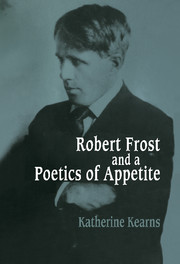Book contents
- Frontmatter
- Contents
- Acknowledgments
- Introduction: The Serpent's Tail
- 1 Irony: Teiresias's Gaze
- 2 Irony II: This Is Not a Pipe
- 3 Women: Dryads, Witches, and Hill Wives
- 4 Eros: The Mischief Maker
- 5 Prosody: White Noise
- 6 Lyricism: At the Back of the North Wind
- Conclusion: Out Far and in Deep
- Notes
- Index
- CAMBRIDGE STUDIES IN AMERICAN LITERATURE AND CULTURE
Conclusion: Out Far and in Deep
Published online by Cambridge University Press: 19 March 2010
- Frontmatter
- Contents
- Acknowledgments
- Introduction: The Serpent's Tail
- 1 Irony: Teiresias's Gaze
- 2 Irony II: This Is Not a Pipe
- 3 Women: Dryads, Witches, and Hill Wives
- 4 Eros: The Mischief Maker
- 5 Prosody: White Noise
- 6 Lyricism: At the Back of the North Wind
- Conclusion: Out Far and in Deep
- Notes
- Index
- CAMBRIDGE STUDIES IN AMERICAN LITERATURE AND CULTURE
Summary
To be a poet you have to believe something so hard that it would break your heart if it wasn't true.
Baird W. Whitlock, “Conversations with Robert Frost”Some people want you not to understand them,
But I want you to understand me wrong.
Robert Frost, “A Masque of Mercy”In the spirit of all of Frost's wandering women, I shall divagate back to the issue of gender by way of a brief discussion of the sublime; for Frost the two are not, finally, separable. But first I should admit that Frost's poetry really does begin to kick up its heels when subjected to the critical gaze; like the Witch of Grafton, it eludes respectability, refuses to be stabilized, goes out kiting when it is supposed to be home in bed. Pick up a Frost poem and you have plucked a star, disguised, from a stone wall; it begins to chafe and shuffle in your hands; if you are a critic, writing, it makes your fingers run off in strange tangents, pulling the pen along. If Frost's poetry tends toward the transformative beauties of dryads and hill wives, starting out dry and pithy and ending as fully erotic, it is also exactly like all of those artifacts – stones, axes, chain saws – within it that snap back; use one and it is likely to bite your hand off, or to fly off the handle and split your skull. More than this, his poetry refutes the critic's attempt to separate herself from these energies.
- Type
- Chapter
- Information
- Robert Frost and a Poetics of Appetite , pp. 185 - 191Publisher: Cambridge University PressPrint publication year: 1994



